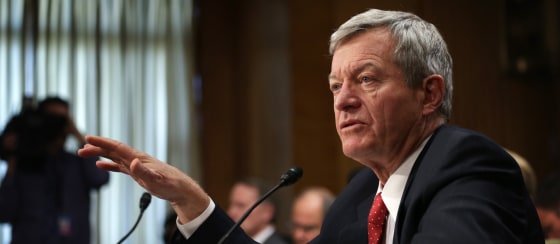
Bernie Sanders once said it would take "a million years" for Max Baucus to support single-payer. It took less than 10 years.

WASHINGTON, DC - JANUARY 28: U.S. Senator Max Baucus (D-MT) testifies during his confirmation hearing before the Senate Foreign Relations Committee January 28, 2014 on Capitol Hill in Washington, DC. Senator Baucus, who was nominated by President Barack Obama, will become the next U.S. ambassador to China if confirmed by the Senate. Alex Wong / Getty Images
Sept. 8, 2017, 9:37 PM UTC / Updated Sept. 9, 2017, 1:28 AM UTCWASHINGTON — In the summer of 2009, Sen. Bernie Sanders, I-Vt. was asked if Max Baucus, the Democratic chairman of the powerful Senate Finance Committee who was taking the lead on health care reform at the time, was open to his ideas.
"To a single-payer idea? No. Not in a million years," Sanders replied to a C-SPAN interviewer.
It turns out the wait was much shorter.
"I just think the time has come," Baucus told NBC News Friday, after stunning healthcare observers earlier in the day by seemingly coming around on single-payer at a public forum. "Back in '09, we were not ready to address it. It would never have passed. Here we are nine years later, I think it's time to hopefully have a very serious good faith look at it."

Baucus' evolution reflects how quickly the once-fringe idea of government-funded health care is gaining traction inside the Democratic party.
On Wednesday Sanders, the issue's most vocal champion, will roll out a long-anticipated bill detailing his plan provide Medicare for All, as advocates prefer to call it.
Baucus, who left the Senate in 2014 to become ambassador to China, was instrumental in the passage of the Affordable Care Act.
But in the process, Baucus became a chief target of the left's ire when he refused to consider single-payer plans and oversaw the demise of the public option, which would have provided a government-run alternative to private health insurance.
"I started out by saying everything is on the table," Baucus recalled. "But I did make an exception and that was single-payer. I said, nope, we're not going to put single-payer on the table. Why? In my judgement, America was just not there . It's branded as socialistic by too many people."
Attitudes have shifted since then.
A majority of House Democrats have, for the first time, signed on to support Medicare for All. And in the past two weeks, Sens. Elizabeth Warren, D-Mass. and Kamala Harris, D-Calif. — two potential 2020 presidential candidates — announced they would support Sanders' forthcoming bill.
On Wednesday, Baucus' fellow Montanan, moderate Democratic Sen. Jon Tester, who is facing a tough reelection bid next year, said it might be time to "take a solid look at" single-payer.
Baucus compared the issue’s evolution to that of gay rights. "It’s anathema for a long time, and then suddenly — acceptance," he said.
“I think we'll end up with some kind of single-pay,” Baucus added, cautioning that it could take years, and stopping short of fully endorsing the idea himself. “It could help reduce costs and also have better outcomes.”
But the policy challenges are enormous, as Sanders' own state of Vermont learned when it scrapped its single-payer plan after the finances collapsed.
And the political hurdles may be just as great, with Democrats entirely out of power and Republicans eager to equate Medicare for All with socialism.
Alex Seitz-Wald is a senior political reporter for NBC News.